选择性必修一Unit4语法:动词-ing 形式作宾语和表语
【课件】Unit+4动词ing形式做宾语和表语课件人教版(2019)选择性必修第一册
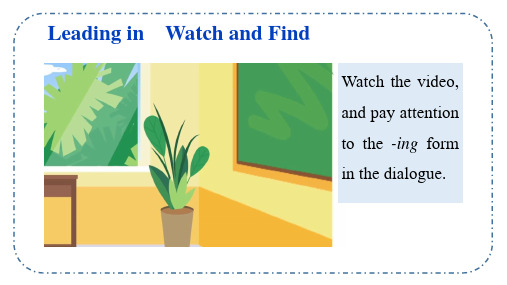
练习
He likes swimming but doesn’t like to swim this afternoon.(swim)
[即时演练1]——单句语法填空 (1)Young people may risk _g_o_i_n_g___(go) deaf if they are exposed to very loud music every day. (2)The bird was so lucky that it just missed _b_e_in_g__c_a_u_g_h_t_(catch). (3)In his childhood, he was fond of __g_e_t_ti_n_g___(get) close to nature.
Leading in Watch and Find
Watch the video, and pay attention to the -ing form in the dialogue.
Observe and Analyze
I enjoy learning about body language in different cultures.
习惯放弃有困难: get used to, give up, have difficulty/ trouble ( in ).. 导致专心不推迟: lead to/ contribute to, be devoted to, put off
Compare
When he means to express friendliness and openness, he always smiles. 当他想表示友好和坦率时,他总是微笑。 That he always smiles means expressing friendliness and openness. 他总是面带微笑,这意味着他的友好和坦率。
高中英语外研版2019新教材选择性必修一unit4语法点
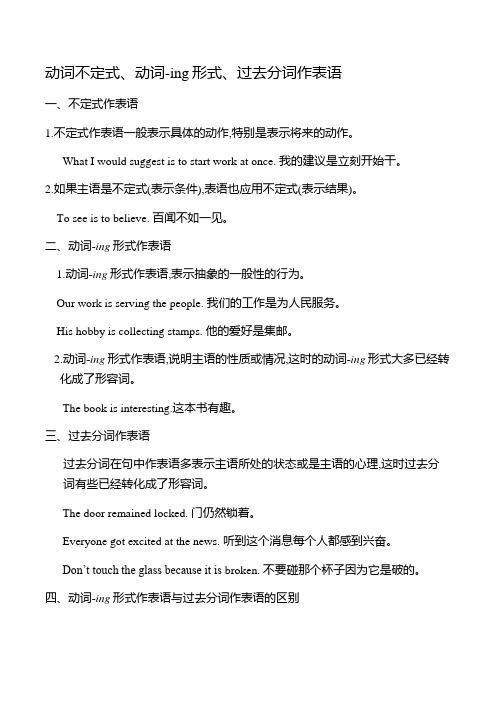
动词不定式、动词-ing形式、过去分词作表语一、不定式作表语1.不定式作表语一般表示具体的动作,特别是表示将来的动作。
What I would suggest is to start work at once. 我的建议是立刻开始干。
2.如果主语是不定式(表示条件),表语也应用不定式(表示结果)。
To see is to believe. 百闻不如一见。
二、动词-ing形式作表语1.动词-ing形式作表语,表示抽象的一般性的行为。
Our work is serving the people. 我们的工作是为人民服务。
His hobby is collecting stamps. 他的爱好是集邮。
2.动词-ing形式作表语,说明主语的性质或情况,这时的动词-ing形式大多已经转化成了形容词。
The book is interesting.这本书有趣。
三、过去分词作表语过去分词在句中作表语多表示主语所处的状态或是主语的心理,这时过去分词有些已经转化成了形容词。
The door remained locked. 门仍然锁着。
Everyone got excited at the news. 听到这个消息每个人都感到兴奋。
Don’t touch the glass because it is broken. 不要碰那个杯子因为它是破的。
四、动词-ing形式作表语与过去分词作表语的区别1.动词-ing形式作表语,说明主语的性质或特征,意为“令人……的”,有主动意思。
如:exciting,moving,amusing,astonishing,frightening,interesting等。
2.过去分词作表语多表示主语所处的状态,意为“感到……的”,有被动的意思。
disappointed,encouraged,amused,astonished,hurt,frightened,amazed,excited,experie nced,interested,qualified,pleased,puzzled等。
高一英语必修4动词ing形式作表语、定语、宾语、补足语和状语
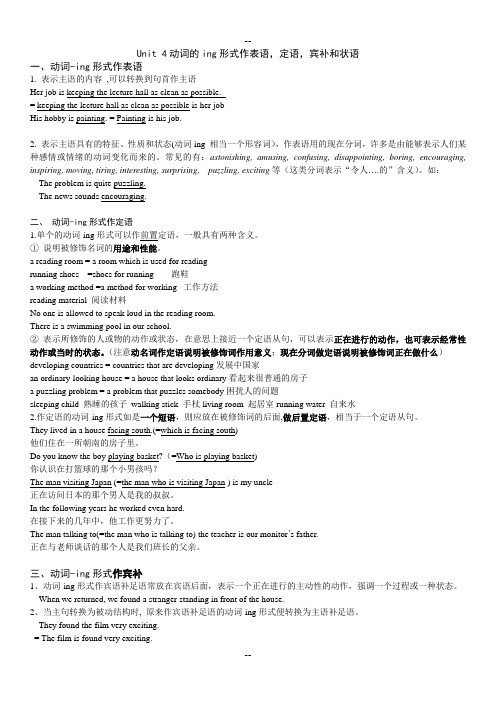
Unit 4动词的ing形式作表语,定语,宾补和状语一、动词-ing形式作表语1. 表示主语的内容,可以转换到句首作主语Her job is keeping the lecture hall as clean as possible.= keeping the lecture hall as clean as possible is her jobHis hobby is painting. = Painting is his job.2. 表示主语具有的特征、性质和状态(动词ing 相当一个形容词),作表语用的现在分词,许多是由能够表示人们某种感情或情绪的动词变化而来的。
常见的有:astonishing, amusing, confusing, disappointing, boring, encouraging, inspiring, moving, tiring, interesting, surprising, puzzling, exciting等(这类分词表示“令人….的”含义)。
如:The problem is quite puzzling.The news sounds encouraging.二、动词-ing形式作定语1.单个的动词-ing形式可以作前置定语,一般具有两种含义。
①说明被修饰名词的用途和性能。
a reading room = a room which is used for readingrunning shoes =shoes for running 跑鞋a working method =a method for working 工作方法reading material 阅读材料No one is allowed to speak loud in the reading room.There is a swimming pool in our school.②表示所修饰的人或物的动作或状态,在意思上接近一个定语从句,可以表示正在进行的动作,也可表示经常性动作或当时的状态。
高中英语人教版(2019)选择性必修第一册Unit4 课件
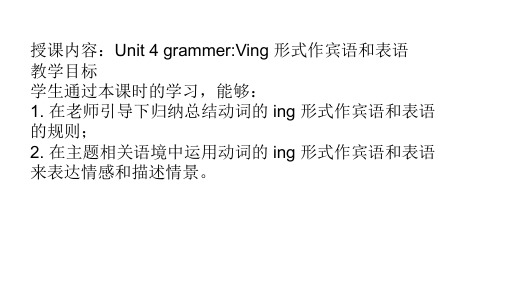
Learning Objectives:
1. To identify and conclude the usage of the –ing form; 2. To explain body language by using the –ing form as the object and the predicative.
“说‘我吃饱了’”。
Find other examples
8. A good way of saying “I am full” is moving your hand in circles over your stomach after a meal.
➢ the -ing form used as the predicative; ➢ moving…meal在系动词is后作表语,说明主语的
授课内容:Unit 4 grammer:Ving 形式作宾语和表语 教学目标 学生通过本课时的学习,能够: 1. 在老师引导下归纳总结动词的 ing 形式作宾语和表语 的规则; 2. 在主题相关语境中运用动词的 ing 形式作宾语和表语 来表达情感和描述情景。
Structure:
The –ing Form as the Object and the Predicative
意为“在巴西和德国做这个手势”。
Find other examples
4. Experts suggest smiling at yourself in the mirror to make yourself feel happier and stronger.
➢ the -ing form used as the object; ➢ smiling…mirror在句中作动词suggest的宾语,
人教版选择性必修第一册unit4重点句式和语法讲解

Unit 4BODY LANGUAGE重点句式1.Just like spoken language,body language varies from culture to culture.就像口语一样,肢体语言因文化而异。
2.The crucial thing is using body language in a way that is appropriate to the culture you are in.最关键的是使用身体语言的方式要适合你所处的文化。
3.In other countries,by contrast,eye contact is not always approved of.相反,在另一些国家,眼神交流并不总是被认可。
4.In Japan,someone who witnesses another person employing the gesture might think it means money.在日本,有人看到另一个人使用这种手势可能会认为这意味着金钱。
5.Even the gestures we use for “yes” and “no” differ around the world.即使我们使用的表示“是”和“否”的手势在世界各地也是不同的。
6.Elsewhere,people favour shaking hands,bowing from the waist,or nodding the head when they meet someone else.在其他地方,人们喜欢握手、鞠躬或者在遇到别人时点头。
7.A smile can break down barriers.微笑可以消除隔阂。
8.Words are important,but the way people stand,hold their arms,and move their hands can also give us information about their feelings.语言是重要的,但人们的站立、抱着双臂和手移动的方式也给我们提供了他们的情感的信息。
高二英语选择性必修第一册(2020版)_Unit4_语法-精讲破

Unit4 BODY LANGUAGE语法-精讲破动词-ing形式作宾语和表语动词-ing形式是动词的一种非谓语形式, 包括现在分词和动名词两种。
一、动词-ing形式作宾语1. 作动词(短语)的宾语观察I don’t like watching television but 1 enjoy listening to the radio. 我不喜欢看电视, 但我喜欢听收音机。
归纳常接动词-ing形式作宾语的动词(短语)可用下面的口诀帮助记忆:避免错过少延期(avoid,miss,postpone)建议完成多练习(advise/suggest,finish, practise)①______想象禁不住(enjoy, imagine, can’t help)承认否定与嫉妒(admit, deny, envy)逃避①______莫原谅(escape,risk,excuse)忍受保持不介意(stand,keep, mind) 2. 作“动词+(名词/副词)+介词” “名词+介词” “形容词+介词”结构的宾语观察He insisted on doing it in his own way. 他坚持要按照自己的方法做。
His lack of experience led to failing in the driving test. 经验不足导致了他驾考没有通过。
归纳常见的跟动词-ing形式作宾语的这类结构有: insist on、object to, be good at、be fond of、lead to, put off, give up、look forward to, feel like, devote. . . to. get/be used to, pay attention to 等。
3. 特殊动词跟动词-ing形式或不定式作宾语的情况观察They continued working/to work as if nothing had happened. 他们继续工作, 似乎什么也没发生过。
新人教高中英语选择性必修一Unit4Body Language单元分析

Unit 4 Body language单元分析单元主题:人与社会——肢体语言单元内容分析本单元的主题是“人与社会——肢体语言”,介绍了不同国家、不同文化、不同场合下肢体语言所表达的意义。
以下为教材各部分教学内容的简要分析及教学活动实施建议:1.Opening Page 主题图是由四张反映不同场景中的典型肢体语言的照片拼接而成,包括女孩和长辈交谈时苦恼困惑的场景、工作伙伴分享成功喜悦的场景、日本商务场合握手鞠躬的场景以及火车站家人拥抱送别的场景。
本页还提供了法国作家、社会评论家罗兰·巴特的名言“What I hide by my language,my body utters.”。
这句话表明通过逻辑推理并观察行为表现、肢体语言等,人们会对言语表达的意思形成更为综合的印象。
2.Reading and Thinking:Understand body language 该板块的活动主题是“读懂肢体语言”。
文章从肢体语言的基本功能入手,引出地域文化这一重要因素,说明正确理解和运用肢体语言一定要考虑在地域文化中的得体性。
该活动的版块设计旨在帮助学生更好地理解文本,分析说明文的文体特征,思考本单元的主题意义。
读前活动,教师要引导学生思考肢体语言的意义,从而能更好地体会肢体语言和有声语言一样是我们交流思想、表达感情和传递信息不可或缺的重要手段。
读中活动,学生快速阅读全文,判断对语篇内容的预测是否正确,然后通过查找段落主题句,归纳段落大意,进而梳理语篇结构。
读中活动通过设计各种不同的问题,引领学生全面了解文章的表层含义和深层意义。
读后活动,设计问题,让学生进行头脑风暴,开展辩论。
3.Learning about language 部分包括Build up your vocabulary 和Discover usefu1 structures 两个板块。
Build up your vocabulary本部分的词汇活动围绕话题词汇设计,帮助学生熟悉词性转化,充分融入词块教学。
2019外研版高中英语选择性必修一Unit4 Using language 语法
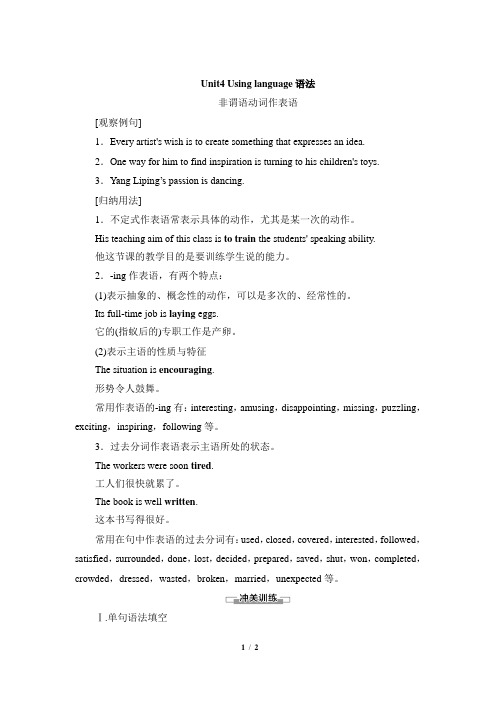
Unit4 Using language语法非谓语动词作表语[观察例句]1.Every artist's wish is to create something that expresses an idea.2.One way for him to find inspiration is turning to his children's toys.3.Yang Liping’s passion is dancing.[归纳用法]1.不定式作表语常表示具体的动作,尤其是某一次的动作。
His teaching aim of this class is to train the students' speaking ability.他这节课的教学目的是要训练学生说的能力。
2.-ing作表语,有两个特点:(1)表示抽象的、概念性的动作,可以是多次的、经常性的。
Its full-time job is laying eggs.它的(指蚁后的)专职工作是产卵。
(2)表示主语的性质与特征The situation is encouraging.形势令人鼓舞。
常用作表语的-ing有:interesting,amusing,disappointing,missing,puzzling,exciting,inspiring,following等。
3.过去分词作表语表示主语所处的状态。
The workers were soon tired.工人们很快就累了。
The book is well written.这本书写得很好。
常用在句中作表语的过去分词有:used,closed,covered,interested,followed,satisfied,surrounded,done,lost,decided,prepared,saved,shut,won,completed,crowded,dressed,wasted,broken,married,unexpected等。
- 1、下载文档前请自行甄别文档内容的完整性,平台不提供额外的编辑、内容补充、找答案等附加服务。
- 2、"仅部分预览"的文档,不可在线预览部分如存在完整性等问题,可反馈申请退款(可完整预览的文档不适用该条件!)。
- 3、如文档侵犯您的权益,请联系客服反馈,我们会尽快为您处理(人工客服工作时间:9:00-18:30)。
选择性必修一Unit4语法:动词-ing形式作宾语和表语
【基础知识讲解】
1.动词-ing 形式作宾语
(1)有些动词后只能跟动词-ing形式作宾语。
有此用法的动词有:allow, advise, admit, appreciate, avoid, bear, consider, delay, deny,enjoy, escape, finish, forbid, imagine, keep, mind, mention, permit, practice, quit, risk, suggest等。
如:
例句:My mother advised asking a doctor to come and examine my eyes.
We’re considering paying a visit to the Science Museum.
You can’t avoid making a mistake.
(2)有些动词后既可跟动词-ing形式作宾语,也可跟动词不定式作宾语,但用法和意义都有所不同。
这些动词是:begin, start, continue, like, love, prefer, mean,forget, remember, hate等。
如:
例句:I remember posting the letter.
我记得我已把信寄了。
I’ll remember to post the letter.
我会记着去寄信的。
2.动词-ing 形式作表语
一种表示主语的性质、特征和状态,其作用相当于形容词;
另一种具体说明主语的内容,即主语等同于表语,两者可互换。
例句:
You look amazing tonight.
Seeing is believing.
The most important thing is getting there in time.
注意:
★–ing形式作主语和表语时与不定式to do的区别:
-ing形式和动词不定式to do作主语和表语的主要区别在于:在表示抽象的一般的多次性行为时多用-ing形式;在表示具体的或一次性的动作,特别是将来的动作时,多用不定式。
如:Eg:Smoking is forbidden here. (泛指吸烟)这里禁止吸烟。
Eg:It's not good for you to smoke so much. (指你吸烟)吸这么多烟对你的身体不好。
【课后检测】
用适当的单词变形填空
1.【★★★】He tried to avoid _________________(answer) my questions.
【答案】answering
【解析】考查非谓语动词。
句意:解析他试图对我的问题避而不答。
分析句子结构可知,已有谓语动词try,因此此处是非谓语动词。
avoid+doing“避免做某事”
2.【★★★】The boy was lucky to escape _________________ (punish).
【答案】being punished
【解析】考查非谓语动词。
句意:这个男孩很幸运能逃脱被惩罚。
分析句子结构可知,已有谓语动词was,因此此处是非谓语动词。
escape+doing“逃脱做某事”,又因为男孩与punish 之间是被动,故填being punished。
3.【★★★】Missing the train means _________________(wait)for another hour.
【答案】waiting
【解析】考查非谓语动词。
句意:误了这班火车就意味着再等一个小时.分析句子结构可知,已有谓语动词mean,故填非谓语动词。
mean doing“意味着”。
4.【★★★】she remained (stand)though we repeatedly asked her to sit down.【答案】standing
【解析】考查非谓语动词。
句意:虽然我们三番五次地请她坐下,但她还是站着。
此处已有remind作谓语动词,因此括号处要填非谓语形式。
5.【★★★】I can get tired of________(look)at pictures all the time.
【答案】looking
【解析】考查非谓语动词。
此处考察非谓语动词作介词宾语。
后面常接动词–ing 形式作宾语的常用短语还有be fond of(喜欢)、have difficulty (in)(在...方面有困难)、be used to(习惯于…)、devote oneself to(献身于…)、look forward to(期待)等。
6. 【★★★】He got wellprepared for the job interview, for he couldn’t risk _________(lose) the good opportunity.
【答案】losing
【解析】他为面试做了充分的准备,因为他不能冒险失去这个好机会。
lose的逻辑主语为he,与逻辑主语之间是主动关系,与谓语动词同时发生,在risk后面作宾语,risking。
7.【★★★】(2020·湖北五校期中联考) Past studies have shown a link between sleeping less and weighing more, but scientists have had difficulty ___________(determine) “which came first, the chicken or the egg?” says Julie Lumeng of the University of Michigan in Ann Arbor.
【答案】determining
【解析】过去的研究表明在睡得少和长得胖之间有联系,但是科学家们很难确定到底是鸡生蛋还是蛋生鸡。
Have difficulty doing sth“在做某事方面有困难”。
8.【★★★】Research suggests that babies learn to see by____________(distinguish) between areas of light and dark.
【答案】distinguishing
【解析】研究显示婴儿是通过区分明亮区域和黑暗区域来学会观看的。
介词by后的动词需要变成动词的-ing形式,distinguishing
9.【★★★】Mom flatly refused _________ (go) back into the hospital.
【答案】to go
【解析】句意:妈妈断然拒绝回医院。
refuse后跟动词不定式作宾语,意为“拒绝做某事”。
10.【★★★】The little boy finally managed _________ (push) the large stone away.
【答案】to push
【解析】句意:这个小男孩终于把这块大石头推走了。
manage后跟动词不定式作宾语,意为“设法做成某事”。
11.【★★★】Dana admitted _________ (feel) hurt by what I said..
【答案】feeling
【解析】句意:达娜承认我说的话伤害了她的感情。
admit后跟动名词作宾语,意为“承认做了某事”。
